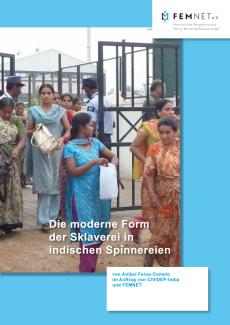Fashion industry
Mainstreaming responsibility

India’s success in the textile industry is driven by a low-cost, highly flexible production system. It is able to respond to sudden fashion changes, as a recently published study by the German feminist initiative FEMNET states. India’s economy is marked by a high share of unregistered, informal businesses. As the report bemoans, however, the government supports these small and mid-sized enterprises without explicit requirements concerning social and environmental standards.
Especially in southern India, young girls are abusively employed in spinning mills, critics point out. A camp-labour-system lures teenagers from poor backgrounds into the spinning mills. The system is traditionally known as “sumangali”. The word means “happy bride” in Tamil. The girls work in exploitative conditions for three years and are eventually paid a sum which is supposed to serve as their dowry. The young girls must do heavy shift work for a pittance and sleep in overcrowded and poorly equipped bunkhouses, the FEMNET study reports.
The state government of Tamil Nadu acknowledges that there are accidents, and some of them are deadly. The main cause is said to be exhaustion. However, there is also a lack of vocational training. Viyakula Mary of Social Awareness & Voluntary Education (SAVE), an Indian NGO, says many girls do not know how to handle machineries, and such ignorance also leads to accidents. Moreover, suicide, sexual abuse and murder are common in the spinning mills, Mary reports. The teenage workers are not allowed contact to their families, and many suffer from mental stress and illness. Making matters worse, most girls never get any proof of employment, so they cannot go to court if their rights are not respected. Should they leave the camp before the three years are over, they go home empty-handed, FEMNET reports.
There are laws that could be used to rescue the girls, says Anibel Ferus-Comelo, the author of the FEMNET study and an activist with Civil Initiatives for Development and Peace (CIVIDEP), another Indian NGO. In the past few years, media coverage and public-awareness campaigns have prompted government agencies to enforce laws and regulations with an eye to formalising the informal sector. However, the language of the laws can be gotten around, so the economic and physical exploitation of vulnerable communities prevails. Ferus-Comelo wants manufacturers to provide proof of employment and promote women to positions of authority in both factories and bunkhouses.
In the fashion industry, consumer pressure could prove powerful. Awareness about dismal labour conditions, especially in sewing factories, has been raised again and again. Catastrophes such as the collapse of a factory in Sabhar, Bangladesh stir up the public’s attention for a short time, but fail to have a long-term impact on policymakers. That is what Frederike Boll of the Friedrich Ebert Foundation, which is close to Germany’s Social Democrats, recently told a conference in Bonn that was organised by the foundation in cooperation with FEMNET. She insists that the entire supply chain must be considered.
One approach to improving matters is to use labels that certify better social or environmental standards. However, no label has been established so far which would really encompass the entire supply chain, Gisela Burckhardt of FEMNET points out.
NGOs appreciate Britain’s modern slavery act which was passed last year. It obliges companies to report on sourcing practices. Report author Ferus-Comelo would like other countries to introduce similar laws. “We need to mainstream corporate social responsibility with due diligence,“ she says. In her view, boycotting fashion firms is not the right way. In the end, poor communities need decent employment, and companies need experienced, healthy workers. The sumangali camps can only be overcome in a multi-stakeholder approach, involving consumers, companies and the workers themselves, she argues.
Floreana Miesen
Link
FEMNET e.V., 2016: Die moderne Form der Sklaverei in indischen Spinnereien (only in German):
http://www.femnet-ev.de/images/downloads/sumangali/Studie-Moderne-Sklaverei_2016.pdf











